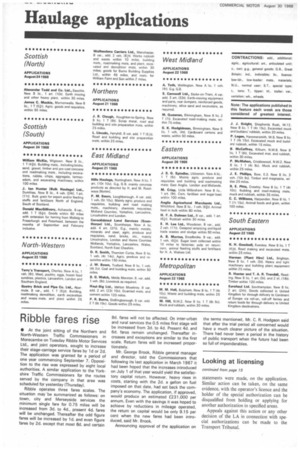Ribble fares rise
Page 22

If you've noticed an error in this article please click here to report it so we can fix it.
• At the ioint sitting of the Northern and North-Western Traffic Commissioners in Morecambe on Tuesday Ribble Motor Services Ltd., and joint operators, sought to increase their stage-carriage service fares by 1d or 2d. The application was granted for a period of one year commencing September 7. Opposition to the rise was expressed by eight local authorities. A similar application to the Yorkshire Traffic Commissioners for the routes served by the company in that area was scheduled for yesterday (Thursday).
Ribble operates three fares scales. The situation may be summarized as follows: on town, city and Merseyside services the minimum single fare for 0.75 miles will be increased from 3d. to 4d., present 4d. fares will be unchanged. Thereafter the odd figure fares will be increased by 1d. and even figure fares by 2d. except that most 6d. and certain 8d. fares will not be affected. On inter-urban and rural services the 0.5 miles first stage will be increased from 3d. to 4d. Present 4d. and 6d. fares remain unchanged. Thereafter increases and exceptions are similar to the first scale. Return fares will be increased proportionately.
Mr. George Brook, Ribble general manager and director, told the Commissioners that following its last application in March 1967 it had been hoped that the increases introduced on July 1 of that year would yield the satisfactory capital return. However, heavy rises in costs, starting with the 2d. a gallon on fuel imposed on that date, had set back the company's economy. The application, if approved, would produce an estimated £231,000 per annum. Even with the savings it was hoped to achieve by reductions in mileage operated, the return on capital would be only 9.15 per cent when the new fares had been introduced, said Mr. Brook.
Announcing approval of the application on the terms mentioned, Mr. C. R. Hodgson said that after the trial period all concerned would have a much clearer picture of the situation. There had never been a period in the history of public transport when the future had been so full of imponderables.




















































































